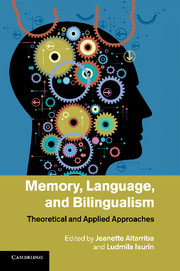Book contents
- Memory, Language, and Bilingualism
- Memory, Language, and Bilingualism
- Copyright page
- Contents
- Figures
- Tables
- Contributors
- Introduction
- 1 Bilingual memory:
- 2 Lexical competition in localist and distributed connectionist models of L2 acquisition
- 3 Working memory and (second) language processing
- 4 Working memory in simultaneous interpreters
- 5 Using electrophysiological measures to track the mapping of words to concepts in the bilingual brain:
- 6 Age effects in L2 learning:
- 7 Bilingualism, language, and aging
- 8 Crossovers and codeswitching in the investigation of immigrant autobiographical memory
- 9 Linguistic relativity and bilingualism
- 10 Testing effects for novel word learning in Chinese–English bilinguals
- 11 The lexicon in second language attrition:
- 12 Memory and first language forgetting
- 13 Future research directions:
- Index
2 - Lexical competition in localist and distributed connectionist models of L2 acquisition
Published online by Cambridge University Press: 05 November 2012
- Memory, Language, and Bilingualism
- Memory, Language, and Bilingualism
- Copyright page
- Contents
- Figures
- Tables
- Contributors
- Introduction
- 1 Bilingual memory:
- 2 Lexical competition in localist and distributed connectionist models of L2 acquisition
- 3 Working memory and (second) language processing
- 4 Working memory in simultaneous interpreters
- 5 Using electrophysiological measures to track the mapping of words to concepts in the bilingual brain:
- 6 Age effects in L2 learning:
- 7 Bilingualism, language, and aging
- 8 Crossovers and codeswitching in the investigation of immigrant autobiographical memory
- 9 Linguistic relativity and bilingualism
- 10 Testing effects for novel word learning in Chinese–English bilinguals
- 11 The lexicon in second language attrition:
- 12 Memory and first language forgetting
- 13 Future research directions:
- Index
Summary
Learning a second language (L2) implies the incorporation of its words into a lexicon that already contains words of the native language (L1). This chapter considers whether special mechanisms must protect L2 learning in its early stages, how learning the L2 early or late affects the organization of and access to bilingual memory, and how “special” words, like cognates and false friends, are acquired and processed. In addition, it examines the role of competition (inhibition) mechanisms in L2 word learning and L2 word identification according to localist and distributed connectionist models. Simulations with a localist model show that it can account for orthographic aspects of L2 acquisition without assuming any special mechanisms beyond lateral inhibition. The model differentiates the development of the L2 lexicon into stages of sequential or simultaneous L1/L2 learning for various types of words. Simulations with a distributed model show that cognate facilitation and false friend interference effects can be understood not only in terms of an on-line identification perspective but also from a learning perspective. A theoretical comparison of model types concludes the chapter.
Information
- Type
- Chapter
- Information
- Memory, Language, and BilingualismTheoretical and Applied Approaches, pp. 48 - 73Publisher: Cambridge University PressPrint publication year: 2012
Accessibility standard: Unknown
Why this information is here
This section outlines the accessibility features of this content - including support for screen readers, full keyboard navigation and high-contrast display options. This may not be relevant for you.Accessibility Information
- 5
- Cited by
